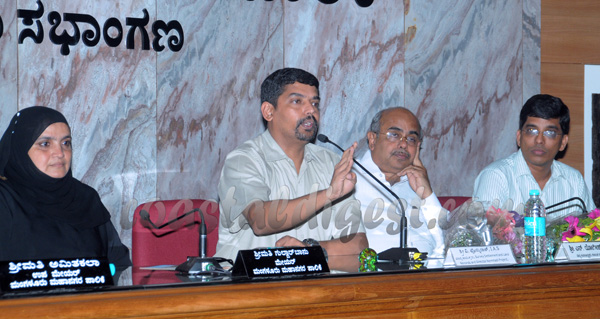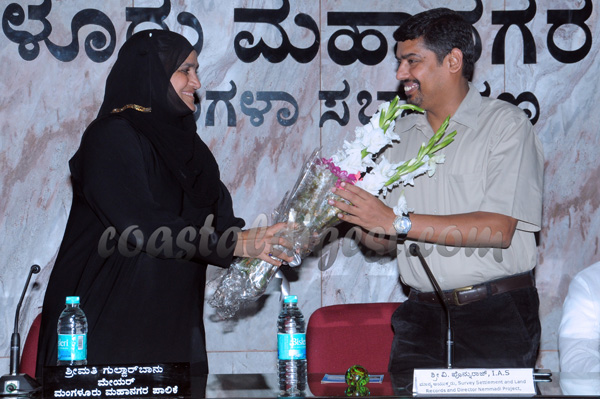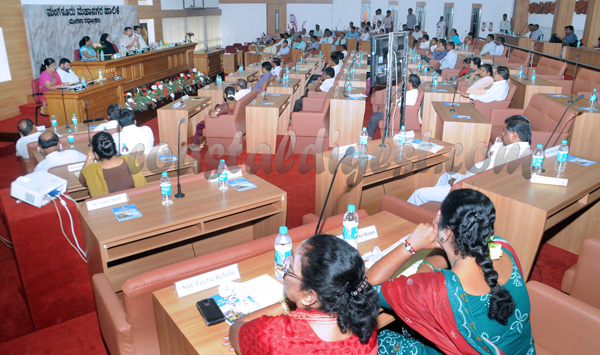
Mangalore, September 3: The Property Cards (PR Cards) which would be given to owners of properties as part of the implementation of the Urban Property Ownership Records (UPOR) project, would act as a 'mirror' which would reflect the true property status in the city, said V Ponnuraj, Commisioner, Survey Settlement and land records and head of Urban Property Ownership records project.
Addressing corporators at a meeting convened at the Mangalore City Corporation to clarify doubts concerning the UPOR project on Monday, Mr. Ponnuraj said that the PR Card would reflect the spatial reality of the property besides explaining its legal status.
The project implementation work has advanced at a good pace at Mysore and Shimoga cities but there were hitches as far as Mangalore was concerned since the work carried out by the private partnering agency was not satisfactory. A different agency has been entrusted with the job of conducting survey and helping in the implementation of the project in the city, Mr. Ponnuraj said. In Mysore and Shimoga, survey work has seen 100% completion, he said, stating that now issuance of PR cards is in the process there. In Hubli-Dharwad, one third of survey work is still pending while Bellary and Mangalore cities are also yet to see completion of survey work, he said.
During the survey, the space dimensions, past record of the property in terms of RTC, municipal documents and other records etc are ascertained and only after a complete information gathering is a property card granted to the owner of the property, Mr. Ponnuraj said. Factors such as lease, loans, river flow over the concerned property etc are also taken into consideration, he reveald. Markings are made after informing the owner of the property as well the owners of the neighbouring properties, he said. A duration of 30 days is allotted to the concerned parties to place before the UPOR authorities any complaints with regard to the survey and after the completion of the said duration, the card is finalled, he said. However, Mr. Ponnuraj added that even after granting a PR card, there is scope for people to challenge its issuance and disprove the survey details false by taking the matter to court, within 3 years of issuance of the card.
Responding to the query of one of the corporators with regard to the fees people would have to pay to get the PR cards, Mr. Ponnuraj said that no money is charged from people for UPOR processes up till the issuance of the card. To obtain the cards, property owners would have to pay charges based on the category that they belong to. Charges would also be determined depending on the size of the concerned property, he said. For the poor and lower middle class, and the minimum plot (about 600 sq. ft) charges would range from Rs. 300-500, he said, while property owners of commercial as well as residential properties measuring more than 1 acre would have to shell out around Rs. 4,500-5,000. The payments would be one-time payments.
When asked about irregularities in the already existing RTC and other records, Mr. Ponuraj said that adjacent lands would also be surveyed and an honest attempt at ascertaining whether some portion of the property had been wrongly encroached would be made before entering data into the Property card. If adjacent land records are also found to be correct, then the existing land record details would be considered for the concerned property, he said.
In case of the land or property being disputed and being sub-judice, a survey would be conducted nevertheless and name of the owner would be mentioned as mentioned in the records but it would be recorded in the PR Card that the matter is in the court of law, he said.
In case of divisions of property, new property numbers would be given and separate cards would be made, Mr. Ponnuraj said. A UPOR Cell would come into existence in the region which would keep track of such updates and developments, he informed. In case of a property being in the name of a person who is no more, it would be seen if his children are willing to divide the property. If they do not, then the PR card for the property will be issued in the name of all children, he said.
About two and a half lakh properties exist in Mangalore and each one has to be given a PR card, he said. The PR card will serve as a legal document for registration and statutory purposes. There is no scope for cheating with PR card, he added, stating that voter ID cards and UID cards would be linked to the PR card.
The project is being implemented on a Public Private Partnership (PPP) basis, Mr. Ponnuraj said, stating that 66% of the funding is being done by the government while 33% of the investement has to come from private agency. The private party has been made to invest so that the quality of work is maintained and that its output is linked to the investment, he said.
N Yogish Bhat, Deputy Speaker, Karnataka Legislative Assembly, Gulzar Banu, Mayor, Amitha Kala, Deputy Mayor and Dr. Harish Kumar, Commissioner, MCC, were also present.







Comments
Add new comment